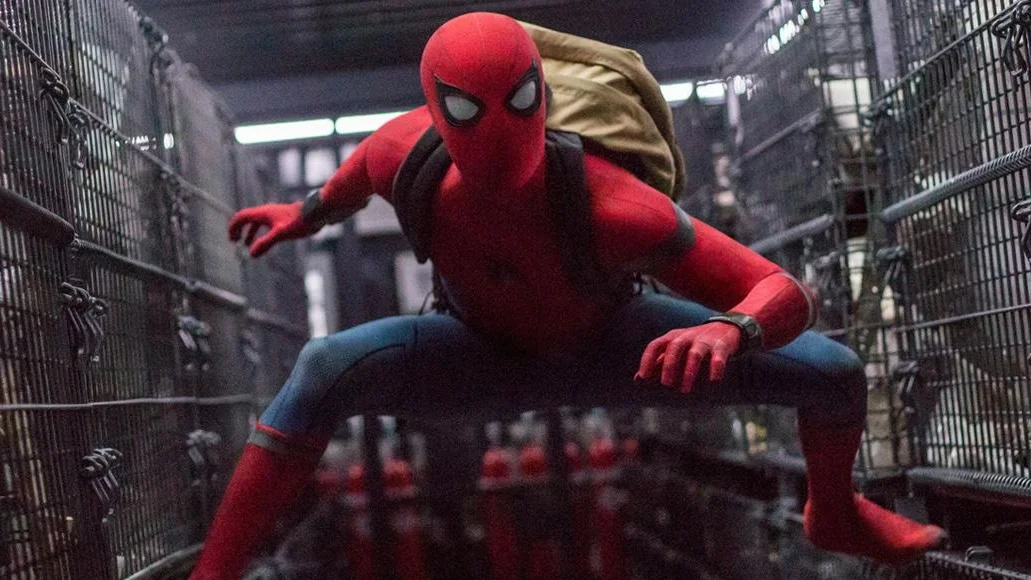Review: Spider-Man: Homecoming
When director Jon Watts and company declared that the newest standalone (but not too standalone, because some Avengers have to join in on the fun) version of our friendly neighborhood Spider-Man would evoke John Hughes, he certainly meant it.
Following a brief prelude, Spider-Man: Homecoming opens with Peter Parker (Tom Holland) being chided by his friend Ned (Jacob Batalon) to come build a Lego Death Star after school. A gaggle of girls laugh in the background, overhearing their conversation. It’s exactly the kind of high school atmosphere the previous Spider-Man films have lacked. Parties, field trips, and Peter’s “internship” with Tony Stark (Robert Downey Jr.) make up the bulk of the backdrops for Homecoming’s narrative. In many ways, the relatively novel atmosphere – at least for a big budget superhero flick – alleviates the fairly bog-standard story structure.
As with last summer's Captain America: Civil War, Marvel seems keenly aware of the fact that with a half-century of the wall-crawler, Spider-Man's origin story is practically seared into the brain of every human on Earth, with the entirety of it skipped with only a few casual mentions here and there. This seems to be the main motto of this take: skip the fluff and get to the good stuff. When it does get to the good stuff, Watts is keen on keeping the action compressed to a manageable level. Sure, there are set-pieces, but, apart from a tone-betraying, yet beautiful climax, they're tight enough to never be earth-shattering. Like Marvel’s Netflix output, these are small-scale set-pieces that manage to feel infinitely larger than those in The Avengers films due to the intimate and character-focused identity of the film.
On that note, the tone shifts roughly two-thirds of the way through the film. It’s not drastic, but it changes gears as the movie slides into the third act. I’m generally wary of tonal shifts, especially because they so often fall flat on their promise, but the shift here works. And, it heralds in a surprisingly effective twist that manages to hone in on the previously floaty theme of responsibility and concretize it with a single dialogue exchange. The way Watts uses dramatic irony in this scene is certainly not without precedent, but it’s masterfully wrought nonetheless. Finally, though it’s not extensive, he does experiment visually in some interesting ways adopting modes that I never would have expected to see in a Marvel movie.
Tom Holland, as in Civil War, nails the dual role of both Peter Parker and Spider-Man. His Parker is largely the same genius outcast we’ve seen before, but the way in which Holland weaves in his ingenuity to the fights and setpieces keep the character development rolling along. In previous films, we would get a bespoke scene whose purpose was entirely to flesh out Peter's nerdiness; such as him eating dinner with Otto Octavius and his wife in Spider-Man 2. Here, Watts skillfully and slickly places Parker’s gushing over tech into the action itself. It’s refreshing, and it sticks closer to the comics than we’re accustomed to seeing. The entire cast (apart from Keaton, more on that in a bit) nail their roles. Marisa Tomei’s Aunt May is solid, though she’s hardly given the same amount of attention that Rosemary Harris was given in the original Sam Raimi trilogy. And, Jacob Batalon’s Ned is a delight. The real star of the show in the supporting category is Peter's love interest Michelle (Zendaya). Her dry wit produces some of Homecoming’s biggest laughs and she delivers all of her lines with a cool aloofness that remains charming throughout. It’s certainly a different take on the character, but a welcome one. And, perhaps more than anyone else in the film, I’m excited to see more from her in future appearances.
All this having been said, Homecoming is hardly perfect. Keaton’s Vulture is a lackluster foe that lacks menace with one scene remaining the exception. (The costume design remains on point, so at least he looks good I guess?) He’s meant to be a regular-sized villain and deliberately so, operating under the radar since he knows he can’t go toe-to-toe with Iron Man or Captain America. It’s an admirable doubling down on the smaller-scale of the film as a whole. But, it falls flat when Watts throws a set-piece worthy of a mainline Avengers entry at the screen. If this villain is such a miniature threat, why is he able to cut a ferry in half with essentially the click of a button? I admire the decision to elevate a member of Spider-Man's rogues gallery like the Vulture, who, up until now, has generally been laughably cartoonish. However, he’s simply not the right fit for this story. Kingpin would have made for a better choice – though I understand the desire not to cannibalize the Netflix portion of this universe.
The latest entry in the MCU manages to feel self-contained while still stretching wide enough to allow the character interactions we adore from the comics to spill into the film world. It’s a tight balancing act that Homecoming succeeds in pulling off for the most part, in addition to avoiding the pitfalls of its cinematic universe – mainly the rampant and often intrusive serialization of storytelling – with grace. It manages to create a more compelling and believably nerdy Peter than what we saw from Marc Webb’s incarnation, and being part of the MCU gives Watts latitude in terms of who he can incorporate from the broader Marvel stable of characters. Even with Raimi’s genuinely uplifting take, Watts’ newest feels like the most beaming of the cinematic adaptations of Spider-Man. And, as a delightful bonus, it has one of, if not, the best, most tonally consistent post-credits scenes the MCU has seen. It’s worth the couple extra minute wait.
















